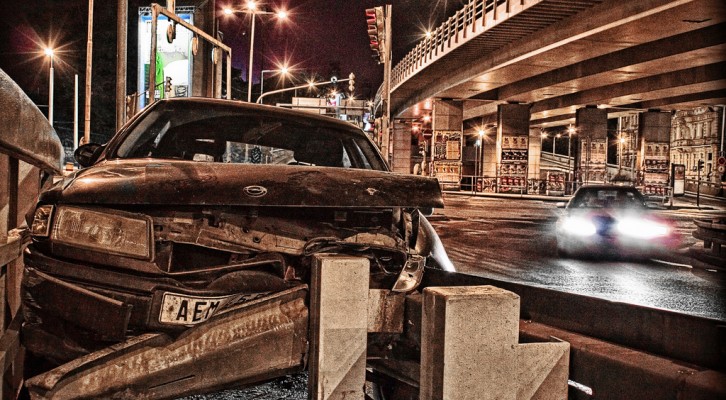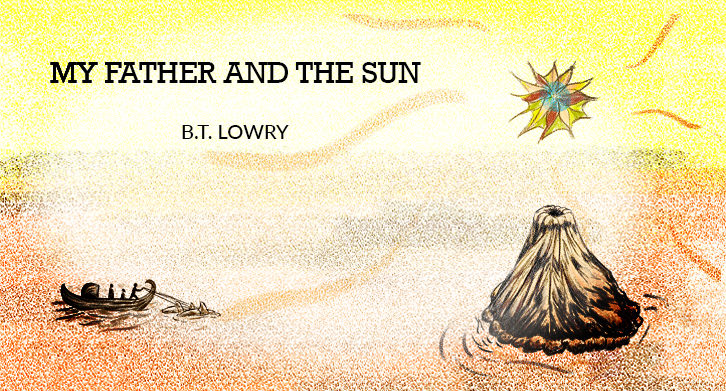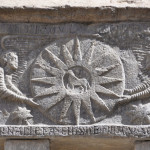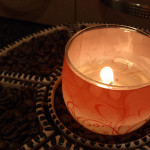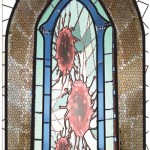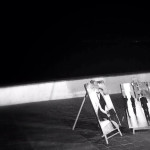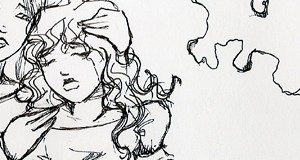Pastor Will Brighton felt the click of his alarm clock, a soft plastic snap in the stillness, and reached up to twist the switch, stopping the gabble of morning DJs from waking his wife Maria. Saturday hadn’t dawned yet; the cold January day outside their window wouldn’t lighten for another hour. He sat up carefully in the sodium-orange glow of the clock dial, swung his legs over the rail, and half-climbed, half-slid out of bed. This lonely dismount from sleep had become, over time, as much a part of his waking ritual as a shower and coffee. God had grown more elusive in the spaces of Will’s soul in the three years since Will’s son died, and early morning darkness was the only time he could feel the Divine anymore.
Warm air from the heater vent tingled his feet as he walked toward Danny’s room. The smoke alarm’s unblinking eye hung overhead, bright in the hall’s mottled shadows. Winter cloaked the house in weight and cold. He gently pushed open Danny’s door and walked into silence, letting the room’s soft flannel-like stillness engulf him. Everything he and Maria couldn’t part with—the short desk with a Toy Story lamp, the neatly arranged plastic totes filled with toys and books, the single bed covered in a space-black fleece spread of rocket ships and galaxies—was neat, uncluttered. Maria dusted once in a while, but this room belonged to Will now.
Will sat lightly on the edge of the bed, perched on an exploding star. Heavy drapes blinded the windows. Dawn was ticking nearer, and Will found this hour of quiet dark was the best time for him to sit quietly and feel the Presence that defined his life. He knew without question that Presence was always there, had many times preached this to congregations that sometimes paid attention and sometimes didn’t, but it was only real to him in the pre-sun solitude. He folded his long, tapered fingers together and closed his eyes. Heated air wound through vents and ducts, keeping time with the house’s creaks and settlings. Relaxed, eyes closed, Will listened, forcing back the words that rose in his throat.
Many mornings, he longed to speak, give shape to the bitter and wounded things in his chest that circled his thoughts, waiting for his spiritual side to weaken. Giving his grief and pains shape might help, but a sad voice within cautioned that speaking aloud would drive away any vestige of the Spirit. Through his ecclesiastical training, he had been instructed in many metaphors, many ways of understanding how Divinity might manifest, but to Will, the presence of divinity was like an open telephone line in him, an expectant buzz of listening that was only heard when the mortal end of the line held itself still.
Minutes crawled toward dawn. Through the oaken beams and floor of the Victorian-style house, the thrum of the basement furnace tingled in his feet. Warm air wafted up lazily, swinging the hem of Danny’s drapes in a languorous ripple. Maria stirred and muttered in her sleep. She’d be up by seven, regardless of whatever she had to do today. He’d sleep the morning away if he could, but knowing Maria was up and about while he lazed about in bed…well, no pastor worth leading people to Jesus would do that. Will learned that at some point in his studies, though he couldn’t remember when.
Soft and swift, he said a prayer. A thin welt of lightening sky appeared through the swaying curtains. His thoughts turned to his son again, as they invariably did after listening for the Lord.
This should still be his room.
Will walked back to his bedroom. There was more than enough paperwork waiting at his office to gnaw at his shopworn sense of duty, plus a sermon that wouldn’t write itself.
Maria’s back was to him, but Will saw she wasn’’t asleep. Something in the set of her shoulders, the arch of her leg curled beneath the comforter, gave away tension. Body language doesn’t lie, Will thought, wondering in what foolish article he’d read that. People lie every day, in words and writing and motion, in ways he couldn’t believe or understand.
“Honey,” she said. She spoke as if she was shaking her head at some offense, though he couldn’t see her move.
“Sorry to wake you,” he told her. He climbed into bed, pulling the covers tightly over him. It gets so cold up here sometimes, he thought. His feet felt like blocks of stone under the sheet. The hum of the clock seemed louder, stretching the silence.
“The new filters should be in today. They’re supposed to be changed every six months,” she said. Her shoulders, pale in the orange glow, felt hard, like angled veins of marble and ice beneath her skin. Will heard the real question beneath her words.
“It’s not what you think,” Will said, moving closer to her. He wanted to pull her into him, warm himself against her, but her muscles bunched in nervous tremors, pulling her away.
“You heard,” she said.
What to say? Of course he’d heard. He was the pastor of First Baptist Assembly, the second-biggest non-LDS church in Prairie Hill , Idaho , a distinction that may not be impressive on paper, but in terms of town gossip made him the next best thing to a switchboard. Everything filtered through his office, it seemed, especially when it came to sin and human failings. The news that Lyman Charles was being released from the state psychiatric hospital in Blackfoot was only delayed from reaching him, not stopped.
“Janice told me,” Will said. “She was very apologetic.”
Maria sighed. “Probably lost the draw.” She turned over and faced him.
It was Will’s turn to sigh. “I’m tired of it, sweetheart. We did our public grieving, we approached his family. They’re ready for Lyman to come home.”
Maria said nothing. Her eyes remained unreadable, and locked onto his. Everything in their language, the gestures and glances that only years of dedicated marriage can create, made her next question clear.
“I’m a professional forgiver. That’s part of the job.”
He turned his back to his wife and closed his eyes.
***
The melodic plink of the piano keys soared throughout the church, soothing Will’s nerves even as he struggled with creating his latest sermon. Listening to Janice work her way through a program was his sonic equivalent of a hot cup of tea, which is why he tried to write when she was practicing. It wasn’t so much the elegance or beauty of the music—although with her experience as an itinerant music teacher, she had that down cold—as it was the effort, the attempt to capture something strong and holy armed only with talent, hands, and faith.
Will sometimes thought he’d be serving his flock better by not talking at all and just letting Janice play for an hour or two every Sunday. A couple of hymns, some Beethoven, a little bit of Handel during the holidays. He wasn’t ready to face obsolescence just yet, however, so he kept the idea under wraps.
A half-empty legal pad sat on Will’s desk, centered in the only free space available. Stacks of books and papers—a Bible with bookmarks like quills sticking out from every chapter, a desk reference set from Encyclopedia Britannica, printouts of work orders and bills—towered over his cramped writing area, shadowing the list of topics in black ink down the left side of the pad’s top sheet.
Will mentally checked off his list as he sat back, chair wheels squeaking against the hardwood floor. Charity: did that one last month. Salvation: doing that one next month. Role of faith in a secular world: kind of tired of it, we’ll let it rest for a while. Maybe I should go through one of my old ones, brush it up a little. His eyes focused on the next one in line.
He tapped his pen against the pad, underlining the word in his head. Forgiveness. Mercy. The quality of mercy is not strain’d, it droppeth as the gentle rain from heaven. Will put his pen down and leaned back, staring up at the ceiling. What play was it? His hands smoothed his hair absently. I know I’ve read that play, or seen the movie. Carefully he ignored the word itself, marked by a pen-shaped indentation in the paper.
A cough at the door drew his attention from the ceiling.
“Come in.”
Edgar Charles walked into Will’s office, a weathered felt hat in his hands. More people in Prairie Hill could identify Edgar’s faded gray hat than his face; the once-black fedora usually rode low over his eyes, which were always looking down at the sidewalk or street. Will was more surprised to see Edgar without his wife Nancy, the speaker for that marriage. Edgar was supposedly a lot more sociable before his only child, Lyman, was born, before he started working graveyard lathing miles of board-feet for Potlatch, but that was only rumor.
“Pastor Will,” Edgar said. He stood before Will’s desk, holding himself still except for his hands, methodically squeezing the shape out of the brim. Normally, Edgar was not a nervous man; even during Lyman’s hearing—Will had never been able to think of it as a trial, though everyone called it so—Edgar had been ceaselessly stoic, a man for whom eye contact and emotional expression were apparently bad things. Lyman’s sentence had been neither a relief nor a punishment to Edgar, as far as Will had been able to see. Will felt much the same, which in his eyes, gave him and Edgar something in common besides their denomination.
“Edgar,” Will said. He motioned to the plush chair parked next to his paper-drowned desk. “It’s been a while. How are you?”
Edgar sat gently, sighing as he did. On a good day, Edgar might have topped the scales at 140, but he moved like a man twice that. “I’m sure you heard, but I thought I’d say it in person. My boy’s come home.” Edgar sounded pinched, like he’d swallowed a mouthful of lemon and the pucker wasn’t off him yet.
Will nodded. “It’s time. He served his sentence.”
Edgar returned the nod, but his mouth was still bowed. The words don’t taste good to me either, Will thought. You get your boy back.
“You’re a better man than me, Pastor,” Edgar said, eyes downcast. “I know it ain’t Lyman’s fault, but I…I can barely look at him.”
“Like you said, Edgar, it wasn’t Lyman’s fault. He didn’t know what he was doing.”
“Sure,” Edgar mumbled. “That’s what everybody said.”
Will kept his peace for a moment. The sequence of events wasn’t a mystery; the investigating officers had been able to forensically recreate what happened with startling clarity. Hearing the description in court, the events laid out in precise, formal language from the investigating detective, had struck Will as if he’d seen the events himself
Lyman Charles, who was ten at the time and who possessed an IQ of 78, had been playing in his front yard with Danny, who lived two blocks away. Danny and Lyman had been playing with trucks at the edge of the driveway, until Lyman got bored and wandered up the driveway, which was on a hillside. Danny stayed with the toy trucks. Lyman walked up to Edgar’s Impala, opened the driver’s door and climbed into the car, where he began pretending he was driving. At some point, Lyman unintentionally released the parking brake.
Danny’s death had not seemed quite real to Will until that point, sitting in the courtroom gripping Maria’s hand, listening to one of his congregation describing the end of his child’s life. Will remembered his stomach coming alive, wrapping itself around each word, boiling and tearing against itself, making him sweat in the cool of the courtroom. The detective, a short gangly man named Larsen, had described the path of the driveway, how the angle of the Impala was in a direct line of sight with Danny, who was playing where the driveway curved before touching the street.
The car had come straight down the hill, picking up speed until it reached the curve in the driveway, where the car left the driveway and continued straight down the hillside. The rear right corner of the bumper collided hard with Danny’s temple. The boy, Larsen said, probably was dead before he hit the ground. The coroner’s report indicated that Danny had not suffered, Larsen testified, that Danny hadn’t even had time to look up and realize what happened. He made no mention of Lyman’s hysterics from being trapped in a rolling car, of how it took the EMTs and Edgar, still half-asleep and stumbling, several minutes and a shot of a mild narcotic to calm the boy down.
“God doesn’t make deals,” Edgar said. Will’s attention came back to Edgar, but Edgar didn’t seem to notice, or care if he did. Will shook his head.
“No. Mysterious ways don’t include bargains.”
Edgar looked sternly at Will. “I know that’s the party line, Will, but I don’t buy it. People are always offering bargains to God; you telling me He never takes us up on them?”
“Prayers getting answered regular like that would make the news,” Will said softly, surprised. Edgar never used his name without “Pastor” before. Well, one man’s child kills another, that makes them like family in a Cain and Abel kind of way, a cold voice in his heart said.
“Didn’t say prayers. God must want something of us, something a man could trade.”
Will thought about that for a moment. Edgar was right; there was a party line on questions like these, and just because it was the right one, a chain of ideas that had been argued and prayed upon by millions for centuries, that didn’t always make it sound like the truth, instead of something to just spout off in times of trouble. Will understood this better than he wanted. He also didn’t disagree, not entirely anyway. He even knew what Edgar wanted to hear. Will, however, did not consider himself a liar.
“Maybe He does, Edgar, but I don’t think we have anything worth the cost of a miracle.”
Edgar’s eyes widened at Will’s words, but whether in surprise or agreement, Will wasn’t sure. Edgar started to say something, but changed his mind. Moving like gravity had just increased, Lyman’s father stood, clapped his battered fedora on his head—pulling it low over his eyes without thought—and left Will’s office. A silvery arpeggio of notes, a cheerful slice of melody that could have been Mozart or Brahms, spilled through the open door as he walked away.
***
Wind in Prairie Hill is a hard thing, flat and toothed, a coldwater shark of air and dust that thunders down from the Tetons, gathering force from the gullies and valleys in its path and explodes into town, rifling trees for autumn’s last leaves. It pries its way past clapboard shells, around dust-spattered siding and dusted chinks in brickfronts, leaking frost and shaking fragile bones inside. Wind, especially in the winter, is fine weather for solitude.
Will stood at the sliding glass door leading out to his yard, a coffee mug of mint tea in his hand, listening to winter shiver the door in its tracks. His eyes followed a rutted and barren path, lumped from the earth by game before the woods were settled and generations of Prairie Hill folk since, as it kissed the edge of his property and spun off into the skeletal trees. His home marked the transition from town to country, with a ragged but spacious back yard that abutted a stand of old forest, one of the few stretches of birch and pine that Potlatch or Idaho Pacific had missed in the boom years. On the town side of the woods was Ten Point Pond, a local swimming hole and occasional ice rink in deepest winter.
On the town side of Ten Point, a black ribbon of bike path ran alongside the pond, frozen over into an unmarked curving sheet that glistened like newly washed porcelain, arcing gently in contour with the pond until forking on the end closest to Will’s neighborhood, where the bike path continued into the suburbs while a rough hardpack lane jagged back into the woods and eventually crossed the old game trail near Will’s yard. Around and across the path, naked branches cast faded shadows from the iron glow of high desert clouds. Despite the furnace, the only heat was the mug in Will’s hand, tea slowly reaching tepid as he stared out across the woods. From where he stood, a swath of Ten Point was visible, glowing against the woods’ mottled underbrush.
Someone was walking along the edge of Ten Point, tracing along the edge of the pond ice with a loose, slumbering walk. The town had spread gravel along the shoreline in July, and it hadn’t been trampled down yet; Will had stumbled on it once or twice. Will couldn’t see who it was walking along—the pond was too far away to make out faces, even if the walker hadn’t worn a dark green ski mask—but the coat was unforgettable; Will recognized it as Lyman Charles’ winter wardrobe. Thick and reaching to mid-thigh, it looked like a burnt orange carpet roll someone had sewed sleeves and a hood on, and was spectacularly ugly at any distance. Lyman had worn the coat for years, looking only slightly less ridiculous with each passing year. Edgar acted as if Lyman wearing the coat was a point of family pride, which it possibly was.
“Edgar should have tossed that by now,” Will said into his cup. The low ache in his chest that kept him company most hours of the day woke, twining around his lungs, stabbing him with every breath. Edgar and Nancy hadn’t been in church on Sunday, and Will was ashamed to be grateful for that, not having to face Lyman in a crowd while he spoke of qualities he no longer believed in.
The figure walked slowly, carefully down to the water’s edge. There was a small pier that edged out to where swimmers could safely dive; the weathered piling was just at the limit of Will’s field of view to his left. Hikers and outdoor travelers, Will included, stayed away from it in winter, as the wood beams quickly iced over into a slide with little regard for friction. It was one of Lyman’s favorite places to go all year round, before his stay in Blackfoot. On the few times Will had seen Lyman out on the pier, there was a peace about his face that Lyman never showed elsewhere. Most of Prairie Hill’s kids of a certain age found themselves at the pier at least a couple of times a year, but for a few like Lyman, it was always popular.
Mint wafted from the cooling tea. Will sipped it, took a larger drink as he watched the orange coat, drawn to the only color in his field of view. It really does look like carpet, Will thought as the figure got down on one knee. A mittened hand ran along the pier’s edge, testing the texture gently as if searching and avoiding splinters. He wondered what Lyman could be looking for, what camouflaged treasure might be biding its time in the wood. The mitten caught on something on the massive side beam, probably a splinter. One tug, then a harder one. A foot repositioned for leverage.
Will opened his mouth, forgetting the door was closed, that he was too far away to be heard even if he’d been standing outside. “Hey—”
The slip was too fast to follow, but not unexpected. A foot lurched out, throwing the body off-balance, toward the flat glossiness of the pond. The figure fell in a graceful arc, coat so bright in contrast it appeared to trail color in an arc, like a falling star against the night sky. Darkness spread in cracks against the perfect ice, radiating out from a patch of exposed water, lapping at its edges.
Will blinked, and reached for the handle of the sliding door. His other hand reached out and put his mug on the counter next to him without looking. The solid white mug, the logo of a local garage emblazoned on one side in red and blue slashes, tumbled and cracked hard against the hardwood floor, splitting into three pieces and spilling lukewarm tea in an arcing splash. He turned his gaze from the pond and stared down at the mess, watching the tea pool around his shoes. Outside, the wind rattled, shaking the branches and shadows.
Blood rushed through his veins, warming him up more than the tea or furnace had. Random facts flashed through his mind: phone numbers, symptoms of hypothermia, the location of spare blankets in the upstairs linen closet. Will moved to start collecting blankets and his phone, and the voice in his heart, that cold part of Will he was ashamed to admit to, spoke again. Some miracles are free, Will. All you need is patience.
He looked outside again. What miracle?
Still, he paused, looking out at the pond. There had been no motion since the fall, and the pond ice was pretty thin this year; tossing a pebble out there was enough to crack the ice most years, and Will’s walks by the pond had shown him this year was no different. The water was pretty shallow, too, even right by the pier; Danny had been able to wade out to nearly the end the summer before he died, and he hadn’t been a tall boy, though he’d been a little bigger than many of his friends. Will thought of those kids, most of them well on their way to forgetting him, passing him over as they raced toward the sum of their lives, and the ache in his chest returned.
The cracked area had grown, spreading the darkness almost entirely across what Will could see of the ice. He must have climbed out and gone for help. There were houses almost up to the edge of the pathway around Ten Point, and Will knew there was no shortage of neighbors to help. He turned away from the door, relieved, and looked down at the squelch of his shoes in spilled tea.
Better clean this up. Will reached over the counter and picked up a hand towel. He pulled the kitchen garbage can closer to him, then picked up the mug pieces and threw them in the can, herding the tea into a puddle to be absorbed, a cross-stitched Proverbs verse in black thread hidden in the towel’s folds. He couldn’t remember which verse; picking up towels and samplers with different verses were an occupational hazard in the pastoring profession. Someone could put together a new Bible with the samplers in the house, Will thought as he mopped up the last of the puddle.
The sodden towel sat in his hand, a spongy and discolored mess, black stitching standing out against the off-white fabric in places. He walked through the entryway to the stairs, heading for the laundry basket, not looking back at the wide portal of winter light from outside. Maybe I’ll do laundry today, Will said to himself. He clumped up the steps to the second floor.
On the kitchen floor, the last vestiges of tea dried in streaks surrounding a pair of footprints, standing before a glass door that opened onto a vista of winter. Bony branches pointed upward, leaving bare trunks and frost-browned underbrush exposed. A rock-hard dirt path led through the trees and brush, to a sheet of porcelain ice contoured and pressed into the earth, its crystalline purity marred by the long shadow of a pier and a web of cracks that brushed the pier itself. Dark water lapped the break, beginning the sublime shift from water back to ice, from shadow to pearl.
***
Moonlight like beams of snow spilled over the windowsill, bright enough to give shadows on the bedroom wall edges. Will lay on his back, eyes turned toward the picture window and the moon that loomed outside like the cataract of God, pale and unblinking. No race to turn off the morning sound today; he’d long since shut that circuit off, knowing that he’d had all the sleep he would get when his eyes opened at three. Maria slept quietly.
Will slid out of bed carefully, taking care not to startle his wife awake with questions and concern. Maria was used to his morning sojourns by now, but if he got up in the night and woke her, her first words would be a question, an expression of concern, and he couldn’t handle that now. She had heard about the boy who’d fallen in the pond at work, had talked about nothing else that evening until bedtime, as though the worry and fear had been hers instead of a family that they didn’t know.
He said nothing, listened and nodded as he let her words fill his mind, driving out the memory of that cold voice within, the one that he had let drown out the other impulses, to help and offer succor in times of trouble. That was his job, his identity, and he had failed it. It was bad enough that he had; telling Maria, like speaking directly to the Divine, would have done nothing to help.
The door to Danny’s room opened at a touch, revealing a newly cleaned and dusted room. Toys, bed, desk: exactly as it was, how it had never really been. Will kneeled by his son’s bed, unslept in for years, and laid his face against the coverlet, overlaying the star-strewn space between whirling planets with cheery green atmospheres.
Words again came to his lips: questions, pleas, admissions of regret. His ear against the bed registered the thrum-thrum of blood in his veins and nothing else. No cars passed by on the road out front, no engines cut the air overhead, searching for lighted pathways home. Around Will, through the ducts, past the pipes, in the stillness of winter morning darkness, a perfect silence weighed upon him, absolute and unmoving in its weight, heeding nothing in its endless splendor.
author
Brandon Nolta is a writer and frequent jack-of-all-trades who is presently seeking help for incessantly referring to himself in the third person. He is still recovering from earning his M.F.A. in fiction, and is recuperating somewhere in southwestern Idaho with his wife, two children and an imaginary three-legged platypus named Eunice.

